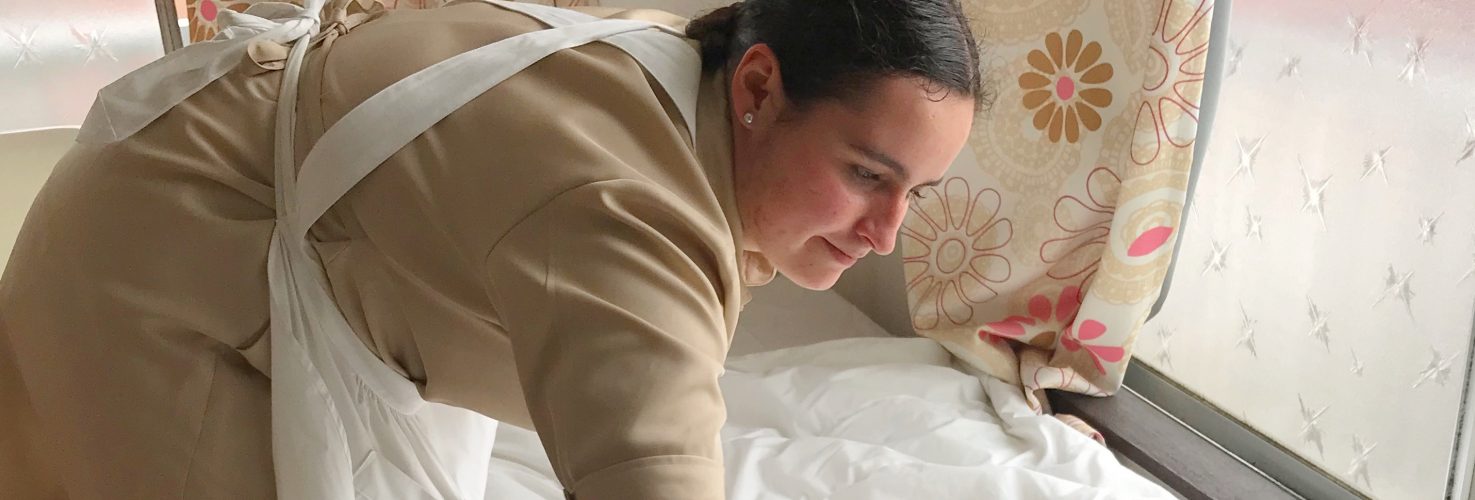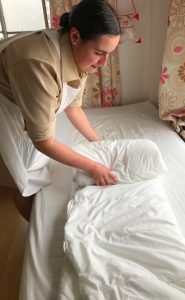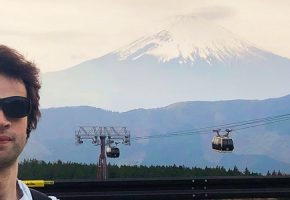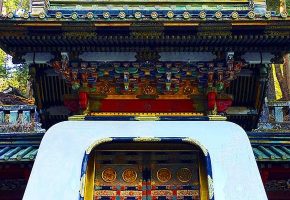Working Holiday Job at a Hotel in Ginza

Working Holiday Job at a Hotel in Ginza
We have visited Katrin H. (20) at her workplace at a hotel in Ginza, Tokyo’s posh area. Katrin is doing a Working Holiday in Japan and works at a housekeeping job – so if a bed has to be made with speed – Katrin is the one to come to the rescue! The hotel is very clean and welcoming, and you will meet a helpful and friendly staff.
Katrin, what made you decide to travel to Japan to work?
It is actually quite a long story because the first time I came in contact with the Japanese culture was all the way back in primary school through my friend. Ever since meeting her, I kept on really appreciating the Japanese culture. Then, after my high school graduation, I didn’t want to start university right away. So I just thought, okay, this would maybe be my last chance to come to Japan for more than just a vacation and experience the culture. So I went, and here I am!
How did you find the job at the hotel in Ginza?
I got it through the internet because the other job introductions that I got through “HelloWork” (employment agency) didn’t have any available jobs at that moment. So I searched online, and then I found another agency similar to “HelloWork”, only for hotels. I applied, and they immediately wrote me back that they had some hotels that were searching like crazy for people. I went there, got an interview, and then I heard I got the job the next day!
For how long are you planning to work at the hotel?
I started to work at the hotel in October 2017 and I will quit in May 2018, because I am planning to travel to Kyoto, Osaka and Nara. After that, it is time to go back to Germany.
What does a typical workday look like for you?
Every single day I go to work during the rush hour – like many other people! Except for Saturday and Sunday because that is my weekend.
When I get to the hotel, I change into my uniform and then wait a little bit until everything is prepared by my boss. I then search for my name on the hotel whiteboard in order to see which floor I am going to be working at. After that, I take the paper with my name and the rooms on it, I get my keycard, and go to my floor and make the beds for 6 hours. After that I’m finished, and once my supervisor has approved my work, I change back to my own clothes and go back home.
What kind of demands come with your job?
You should speak a little bit of Japanese, because there are some guests who want to talk to you, for example, because they don’t know how to turn on the TV, or they ask you other questions. So a little bit of Japanese is really, really helpful. I don’t think there is anything else actually. Just to be able to work normally and to be physically healthy, and speak a little bit Japanese so you  can interact with the guests and with the boss.
can interact with the guests and with the boss.
How much do you earn, and is it enough to cover your living expenses?
I think, if I work full-time like I would do in Germany, I think I would get 120.000 yen per month plus travel expenses which the hotel covers. I can live off that and still save money for later for my travel, so it is really good.
Do you enjoy your job?
It is really stressful sometimes, but it is great. It is really great, because you get to know different people. I don’t think we have any Japanese person working in our hotel, besides our boss, but you learn to interact with each other. The others at my job usually know some Japanese and their mother tongue, so it is just like, okay! I don’t know what you say! So you have to speak Japanese to understand your co-workers as well. Also, you really feel great after a guest comes to tell you that they had a good stay, then you feel that you have done a good job. It was really stressful, but it makes you smile.
Are there certain aspects of your job that you do not like?
Yes, I don’t think there is any job that only has positive aspects. But sometimes I feel like the hotel’s rules for cleanliness can be stressful. Everything has to be very perfectly cleaned, so at times, it feels like they are a bit too strict.
Do you think that working at the hotel helps you in improving your Japanese?
Yes, a lot. It has really helped because most of the guests are Japanese, and you need to interact with them. You can speak English, and some of the guests try to speak to you in English because they see that you are a foreigner and think that you cannot understand Japanese. But I can actually speak Japanese, so there are no worries there! And every time I say that I can speak Japanese, they feel relieved, because they can interact with me, and that is really great and really helpful for me as well. I learn many new words, and it helps me to use my grammar in the correct way. It is really helpful.
I also learned how to make beds really fast! And how to clean toilets and bathrooms in general. I think it is really helpful, but maybe not that helpful in Germany. But it is a great experience and I like my co-workers, so it is great there. My co-workers can be divided into 2 groups: Chinese and Filipinas, and then I am the European in the middle. There are no others – just my boss who is Japanese. So we cannot communicate in English. My Chinese co-workers can’t really speak English and the Filipinas and my boss can speak English, but the only way for all of us to understand each other is to speak Japanese. When we have meetings, for example in order to improve our work, or to handle customer complains, then everything is in Japanese. And because some of the Filipinas cannot speak Japanese that well, the shift manager has to translate it into Tagalog, and then there is another co-worker who is Chinese/Japanese who translates into Chinese to the Chinese employers. So there is a lot of translation going on, and you can hear a few words here and there! For me, if I don’t understand something, then I can just ask my shift manager, and then she can tell me what the meeting was about once more in English.
But all in all, I can just say that I think it is a really nice job!







Leave a Reply